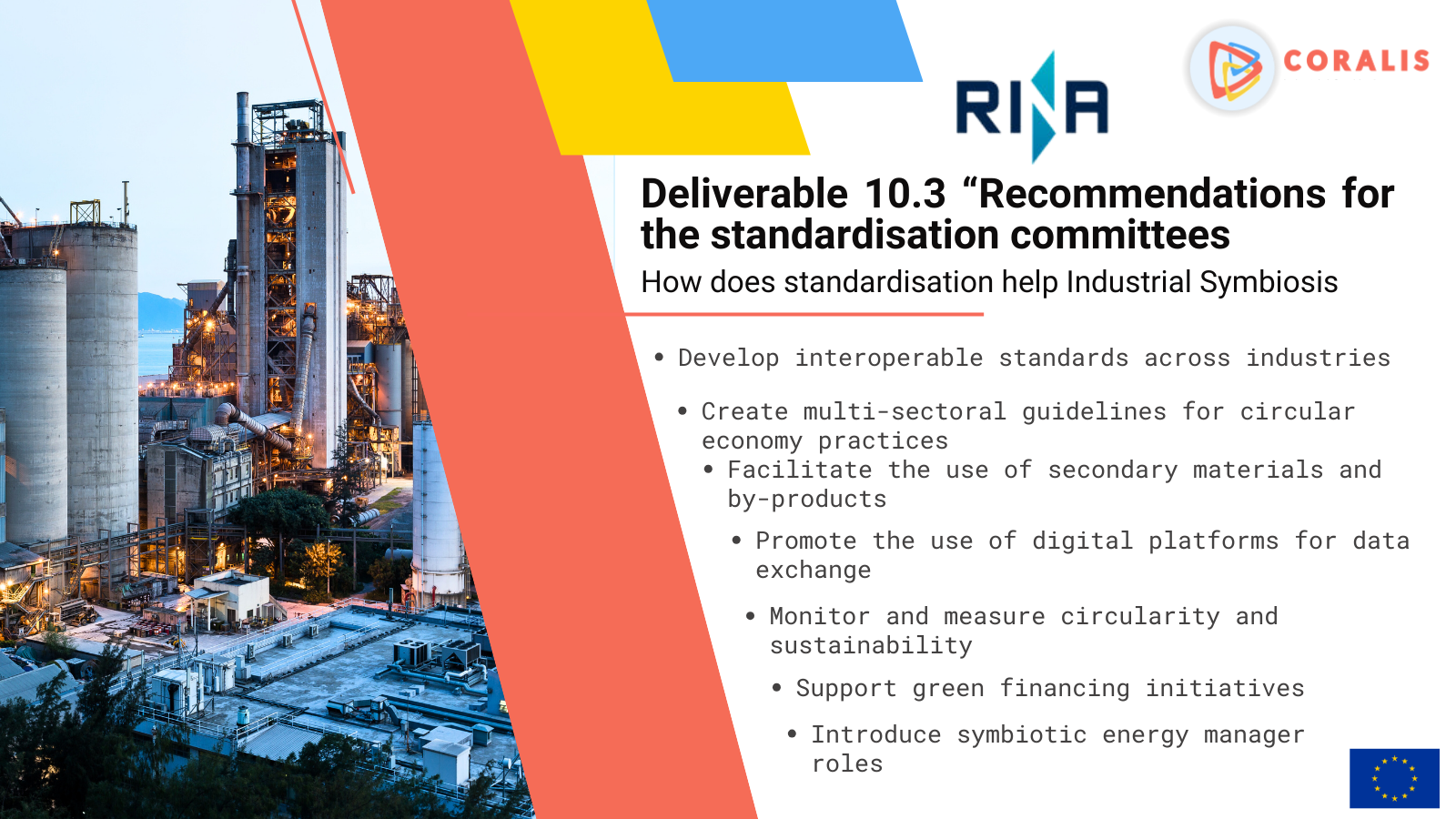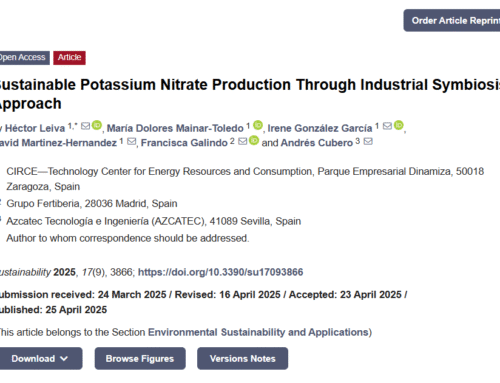The future of European industry is being shaped by the need for sustainability and resource efficiency, with industrial symbiosis (IS) emerging as a key driver. Industrial symbiosis refers to the collaborative exchange of materials, energy, and by-products between industries, creating circular systems that benefit both the environment and the economy. The CORALIS project, with its insights and real-world examples, has paved the way for enhancing industrial symbiosis practices across Europe. One of its important outcomes is Deliverable 10.3 “Recommendations for the standardisation committees”, written by RINA CONSULTING, which offers comprehensive recommendations aimed at improving the regulatory and standardisation frameworks that underpin industrial symbiosis.
What is the role of standardisation in Industrial Symbiosis?
Standards are essential tools that provide clear guidelines, ensuring consistent practices across industries and borders. In the context of industrial symbiosis, standards enable effective resource sharing, facilitate energy efficiency, and support waste reduction. However, the adoption of these practices across diverse sectors and regions requires robust standardisation efforts. The recommendations outlined in Deliverable 10.3 address several key areas where standards and regulations can play a transformative role in enhancing industrial symbiosis.
- Develop interoperable standards across industries
One of the most significant barriers to the widespread adoption of industrial symbiosis is the lack of interoperability between industries. Different sectors often have distinct needs and outputs, making collaboration challenging. Standardisation committees must focus on developing interoperable standards that can be applied across industries, allowing for the seamless exchange of secondary materials and by-products. These standards should include clear criteria for material quality, safety, and environmental impact, ensuring that resources can be reused across different industrial contexts without compromising product integrity or environmental protection.
- Create multi-sectoral guidelines for circular economy practices
The circular economy relies on collaboration between industries, and it is essential that standards provide a common framework for all sectors involved in industrial symbiosis. Multi-sectoral guidelines should be developed to promote cross-sector collaboration on waste recovery, material utilisation, and by-product usage. These guidelines will help businesses identify opportunities for resource sharing and enable them to implement circular economy principles consistently. By establishing a shared understanding of circular economy practices, standardisation committees can help accelerate the transition towards more sustainable industrial ecosystems.
- Facilitate the use of secondary materials and by-products
A key challenge in industrial symbiosis is ensuring that secondary materials and by-products can be effectively reused across industries. Standardisation committees should focus on creating standards that define minimum requirements for the use of secondary materials, allowing for flexibility in their application. These standards should help ensure that materials are optimally used, extending their lifespan while maintaining purity and safety. By streamlining the use of by-products and secondary materials, these standards will promote the development of more efficient and sustainable resource flows.
- Promote the use of digital platforms for data exchange
The effective exchange of materials and energy in industrial symbiosis relies heavily on accurate and transparent data sharing. Standardisation committees should develop standards for digital platforms that facilitate secure, efficient, and interoperable data exchange between companies. These platforms will help monitor resource flows, track energy usage, and ensure compliance with environmental regulations. By creating digital standards that enhance data privacy, security, and interoperability, committees can address one of the key barriers to industrial symbiosis—ensuring that data is shared in a way that is both transparent and secure.
- Monitor and measure circularity and sustainability
As industrial symbiosis grows, it is vital to track its impact on sustainability. Standardisation committees must focus on defining high standards for monitoring circularity metrics, which will allow businesses to assess their progress in reducing raw material use, improving resource efficiency, and lowering greenhouse gas emissions. By establishing clear and measurable sustainability indicators, these standards will help companies benchmark their performance and align with broader European sustainability goals, such as those set out in the Green Deal.
- Support green financing initiatives
To foster the growth of industrial symbiosis, there is a need to align standards with green financing criteria. By doing so, standardisation committees can encourage investment in energy-efficient and resource-efficient symbiotic projects. These projects often require significant upfront investment, and green financing can help make them more financially viable. Creating standards that facilitate access to green finance will allow companies to scale their industrial symbiosis initiatives, driving innovation and sustainability.
- Introduce symbiotic energy manager roles
Managing energy flows is a critical aspect of industrial symbiosis. To support this, standardisation committees should advocate for the creation of symbiotic energy manager roles. These professionals would be responsible for overseeing the coordination of energy exchanges between industrial partners, optimising energy usage, and ensuring compliance with energy management standards like ISO 50001. By formalising these roles, committees can help ensure that industrial symbiosis projects are managed effectively and achieve their energy-saving potential.
Deliverable 10.3 of the CORALIS project highlights the importance of standardisation in fostering industrial symbiosis across Europe. By developing interoperable standards, creating multi-sectoral guidelines, and promoting digital tools for data exchange, standardisation committees can significantly improve the effectiveness and scalability of industrial symbiosis initiatives. These recommendations not only support sustainability but also help industries reduce costs, improve resource efficiency, and meet environmental goals. A coordinated, standardised approach to industrial symbiosis will make European industries more resilient and competitive, paving the way for a greener and more sustainable industrial future.






